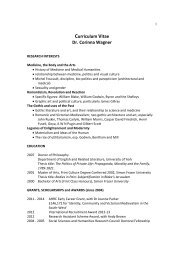'Cast out into the hellish night': Pagan Virtue and ... - Humanities
'Cast out into the hellish night': Pagan Virtue and ... - Humanities
'Cast out into the hellish night': Pagan Virtue and ... - Humanities
Create successful ePaper yourself
Turn your PDF publications into a flip-book with our unique Google optimized e-Paper software.
Philippa Byrne Ex Historia 65<br />
divine? Did Virgil, Horace <strong>and</strong> Ovid enjoy <strong>the</strong> gift of prophecy, as suggested by Cicero’s Pro<br />
Archia, which spoke of <strong>the</strong> poets as ‘holy’? 75 Or, following <strong>the</strong> resolution arrived at by Petrarch<br />
<strong>and</strong> Salutati, did poets have only <strong>the</strong> ‘natural’ knowledge of <strong>the</strong>ology which <strong>the</strong>y arrived at<br />
through reason <strong>and</strong> <strong>the</strong> study of nature? 76<br />
In De voluptate, Valla considers <strong>the</strong> status of <strong>the</strong> poeta <strong>the</strong>ologus by examining <strong>the</strong> truth content of<br />
pagan poetry. The Christian orator, Rho, begins by attacking <strong>the</strong> <strong>the</strong>ological content of poems.<br />
He disparages <strong>the</strong> vision of <strong>the</strong> afterlife propounded in <strong>the</strong> Aeneid:<br />
Aeneas never really descended <strong>into</strong> Hades [...]. The reliability of this notion <strong>and</strong> Virgil’s<br />
authority may be gauged by <strong>the</strong> circumstance, so frequently met with in o<strong>the</strong>r poets, in<br />
which he heaps highest praises on men who never existed. 77<br />
The supernatural content of pagan poetics is sheer invention. Yet such a proposition – <strong>the</strong><br />
absence of truth at a literal or historical level – does not necessarily rule <strong>out</strong> an interpretation of<br />
pagan poetry according to <strong>the</strong> rules of allegory set down by <strong>the</strong> fifth-century neo-Platonist<br />
Macrobius. Indeed, it is against <strong>the</strong> background of Macrobius’ Saturnalia <strong>and</strong> Commentary on <strong>the</strong><br />
Dream of Scipio that this section of De voluptate must be read. Those two texts provided medieval<br />
readers with <strong>the</strong> conceptual tools for extracting philosophical truth from what appeared to be<br />
only poetic fictions. By reading on an allegorical level, penetrating <strong>the</strong> veils of fiction<br />
[integumentum], <strong>the</strong> narratio fabulosa could be forced to reveal hidden truths. 78 A narrative untrue on<br />
<strong>the</strong> literal or historical level, a fable, must be parsed for its real meaning.<br />
75 Cicero, Pro Archia, trans. by Nevile Watts (London: Heinemann, 1979), VIII.xviii, pp. 24-27.<br />
76 Ronald G. Witt, ‘Coluccio Salutati <strong>and</strong> <strong>the</strong> Conception of <strong>the</strong> Poeta Theologus in <strong>the</strong> Fourteenth Century’,<br />
Renaissance Quarterly, 30 (1977), 538-563.<br />
77 De voluptate, II.ix [4] p. 157.<br />
78 Macrobius, Commentary on <strong>the</strong> Dream of Scipio, trans. by W. H. Stahl (New York: Columbia University<br />
Press, 1990), I.ii.1-13, pp. 83-85.









